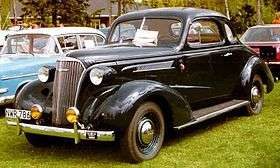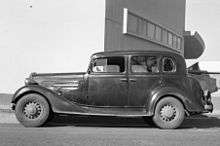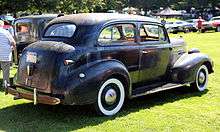Chevrolet Master
| Chevrolet Master and Master Deluxe | |
|---|---|
 1937 Master Coupe | |
| Overview | |
| Manufacturer | Chevrolet (General Motors) |
| Also called |
Series CA (1933) Series DA (1934) Series EA and ED (1935) Series FA and FD (1936) Series GA and BB (1937) Series HA and HB (1938) Series JA (1939) |
| Model years | 1933–1942 |
| Assembly |
Oakland Assembly, Oakland, California North Tarrytown Assembly, Tarrytown, New York Flint Assembly, Flint, Michigan Norwood Assembly, Norwood, Ohio St. Louis Assembly, St. Louis, Missouri Oshawa Assembly, Oshawa, Ontario Canada Osaka Assembly, Osaka, Japan General Motors South Africa, Port Elizabeth, South Africa GM Argentina, Buenos Aires, Argentina GM Belgium, Antwerp, Belgium |
| Body and chassis | |
| Body style |
2-door coupe 4-door sedan 2-door pickup truck |
| Layout | FR layout |
| Platform | "A" body |
| Related |
Standard Pontiac Deluxe Chevrolet Suburban |
| Powertrain | |
| Engine | 206 cu in (3.4 L) 6-cylinder |
| Dimensions | |
| Wheelbase | 113 in (2,870.2 mm) |
| Chronology | |
| Predecessor | Chevrolet Eagle |
| Successor | Chevrolet Deluxe |
The Chevrolet Master and Master Deluxe are American passenger vehicles manufactured by Chevrolet between 1933 and 1942 to replace the 1933 Eagle. It was the more expensive model in the Chevrolet range at this time, with the Mercury and Standard providing a cheaper and smaller range between 1933 to 1937. From 1940 a more expensive version based on the Master Deluxe was launched called the Special Deluxe.
Model years
The Master name was used on a number of different versions, and the Series name changed each year.
1933 (Series CA)
The Series CA Master replaced the 1933 Eagle mid way through the model year when the 1933 Standard model (Series CC) was introduced. Several changes were made to the Eagle when the name was changed to Master. The easiest to identify is the post between the front door wing windows and the roll down windows. On the Eagle the chrome divider between these two windows goes down as the window goes down, where as on the Master this divider remains fixed and does not go down with the window.
1934 (Series DA)

The Series DA Master replaced the 1933 Eagle, with an increased wheelbase of 112 in (2,844.8 mm). This increased the difference with the cheaper Standard wheelbase to 5 in (127.0 mm). Powered by an upgraded version of the "Stovebolt Six", 206 cu in (3,380 cc) six-cylinder engine, now producing 80 hp (60 kW).
1935 (Series EA and ED)
The Master underwent a redesign, utilising a new "Turret Top" construction method.[1]
1937 (Series GA and GB)
The Master now replaced the lower priced Standard Six, while the more luxurious new Master Deluxe edged the range upwards. The vehicle was shared with the Pontiac Deluxe.
1938 (series HA and HB)
The Master (HB) and Master Deluxe (HA) sold well, with 162,430 and 302,728 respectively.[2]
1939 (series JA and JB)

The Master returned for 1939. The Master Deluxe was now the JA, while the base model was renamed the Master 85 (JB). A station wagon was offered, though its construction had been contracted to Mid States Body Corp.[3]
1940 (series KA and KB)
The Master continued to be available in Master 85 (KB) as well as the more upscale "Master Deluxe" model (KA). The even better equipped "Special Deluxe" also appeared for the 1940 model year.
Trucks and buses
This was the last series of trucks and medium-duty vehicles that shared an appearance with Chevrolet passenger coupes and sedans, and were replaced with the AK Series trucks.
 Chevrolet CG 1937
Chevrolet CG 1937- 1940 GMC Truck
 1930s Chevrolet Commercial truck
1930s Chevrolet Commercial truck.jpg) Chevrolet Carryall Suburban
Chevrolet Carryall Suburban 1939 Chevrolet bus
1939 Chevrolet bus
References
- ↑ Gunnell, John. Standard Catalog of Chevrolet, 1912-2003: 90 Years of History.
- ↑ "1938 Chevrolet Master and Master DeLuxe". How Stuff Works. Retrieved 4 January 2013.
- ↑ Odin, L.C. World in Motion 1939, The whole of the year's automobile production. Belvedere Publishing, 2015. ASIN: B00ZLN91ZG.
External links
| Wikimedia Commons has media related to Chevrolet Master. |